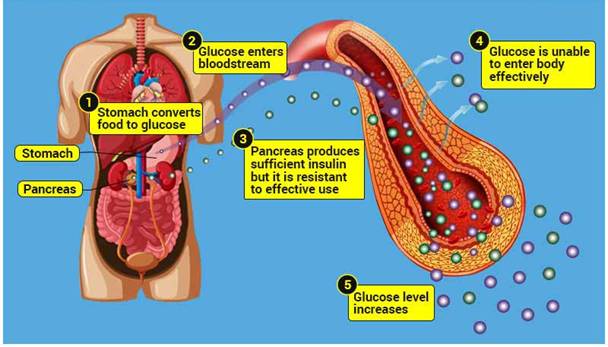A nurse is caring for a client with diabetes mellitus who is prescribed regular insulin via a sliding scale. After administering the correct dose at 0715, the nurse should ensure the client receives breakfast at which of the following times?
0730
0745
0815
0720
The Correct Answer is A
Choice A reason:
0730: Regular insulin, also known as short-acting insulin, typically begins to work within 30 minutes after administration. Therefore, ensuring the client receives breakfast at 0730, which is 15 minutes after the insulin dose, aligns with the onset of insulin action. This timing helps to prevent hypoglycemia by ensuring that glucose from the meal is available when the insulin starts to lower blood sugar levels.
Choice B reason:
0745: Administering breakfast at 0745, which is 30 minutes after the insulin dose, might be slightly delayed. While it is still within the effective window, it is better to have the meal a bit earlier to ensure that glucose is available as soon as the insulin begins to act.
Choice C reason:
0815: Providing breakfast at 0815, which is an hour after the insulin dose, is too late. By this time, the insulin would have already started to lower blood glucose levels significantly, increasing the risk of hypoglycemia. It is crucial to match the timing of food intake with the insulin action to maintain stable blood sugar levels.
Choice D reason:
0720: Serving breakfast at 0720, which is only 5 minutes after the insulin dose, is too early. The insulin would not have started to act yet, and the blood glucose levels might rise too high before the insulin begins to lower them. It is important to wait at least 15-30 minutes after administering regular insulin before eating.

Nursing Test Bank
Naxlex Comprehensive Predictor Exams
Related Questions
Correct Answer is A
Explanation
Choice A reason:
Place a pillow under the client’s head: During a tonic-clonic seizure, it is crucial to protect the client’s head from injury. Placing a pillow or any soft object under the head can help prevent head trauma caused by the convulsions. Ensuring the client’s safety by protecting their head is a primary concern during a seizure.
Choice B reason:
Insert a padded tongue blade into the client’s mouth: This action is incorrect and potentially dangerous. Inserting any object into the mouth during a seizure can cause injury to the teeth, gums, or jaw. It can also obstruct the airway. The myth that a person can swallow their tongue during a seizure is false, and no object should be placed in the mouth.
Choice C reason:
Apply a face mask for oxygen administration: While providing oxygen can be beneficial after the seizure has ended, during the seizure, the priority is to ensure the client’s safety and prevent injury. Applying a face mask during the active phase of a seizure is not practical and can interfere with managing the seizure safely.
Choice D reason:
Gently restrain the client’s extremities: Restraining the client’s extremities during a seizure is not recommended. Attempting to restrain the movements can cause injury to both the client and the nurse. The focus should be on protecting the client from harm without restricting their movements.
Correct Answer is C
Explanation
Choice A reason:
Promoting oral hygiene is important for preventing infection and maintaining overall health, especially after surgery involving the mouth. However, it is not the immediate priority in the postoperative period.
Choice B reason:
Ensuring adequate nutrition is crucial for healing and recovery, but it is not the most urgent concern immediately after surgery. Nutritional needs can be addressed once the client is stable and the risk of complications has been minimized.
Choice C reason:
Preventing aspiration is the priority action. After surgery for a fractured mandible with intermaxillary fixation, the client is at high risk for aspiration due to the inability to open the mouth and clear secretions effectively. Aspiration can lead to serious complications such as pneumonia, making it the most critical concern.
Choice D reason: Relieving the client’s pain is important for comfort and recovery, but it is not the highest priority immediately after surgery. Pain management should be addressed once the client’s airway and breathing are secure.
Whether you are a student looking to ace your exams or a practicing nurse seeking to enhance your expertise , our nursing education contents will empower you with the confidence and competence to make a difference in the lives of patients and become a respected leader in the healthcare field.
Visit Naxlex, invest in your future and unlock endless possibilities with our unparalleled nursing education contents today
Report Wrong Answer on the Current Question
Do you disagree with the answer? If yes, what is your expected answer? Explain.
Kindly be descriptive with the issue you are facing.
